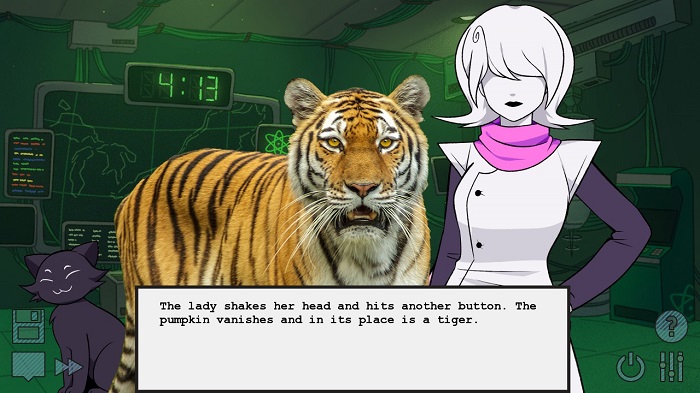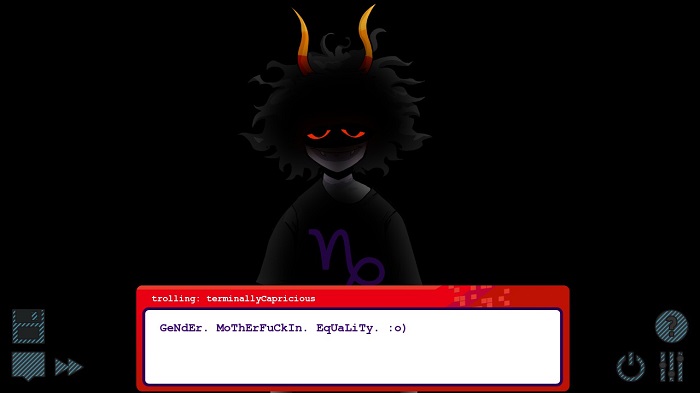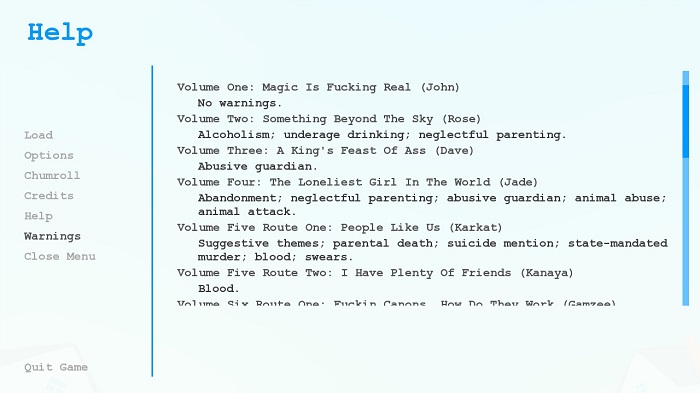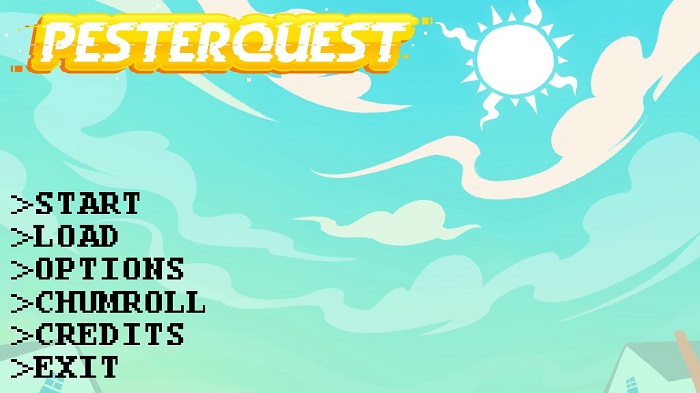Subjective:
Developer What Pumpkin Games, Inc. and publisher Fellow Traveler present the visual novel Pesterquest for review. By stepping into the role of a hooded stick person of above average detail, players may immerse themselves into the self-described “grimsical” world of Homestuck. Laughter, darkness, adults lying badly, and a heaping helping of digital culture await.
Objective:
Even in the straightforward realm of visual novels, Pesterquest is slight in terms of options. There are 14 chapters, some split up into different paths, and within each chapter there are a handful of choices to steer the story in a specific direction. If the player is unhappy with the ending they received, or are curious what happens with the other choices, Pesterquest includes a handy fast-forward button to skip passed dialogue previously read to jump straight to the choices. This is all illustrated with cartoon characters, the odd insert of real world photography, a bevy of visual effects, and handy end cards.

Assessment:
I’ve commonly read that, to enjoy Pesterquest, it’s best to already be a fan of Homestuck. For those not in the know, Homestuck is a vast multimedia internet experience which started as a webcomic. My only previous exposure came from a meme of Sweet Bro and Hell Jeff, which is a webcomic within a webcomic within Homestuck.
Now that I’ve gone through Pesterquest I’ve got to wonder if fans of Homestuck are trapped in a potentially abusive relationship with the multimedia story. So much of Pesterquest drips with bitterness and borderline contempt for its consumers. The game opens on a featureless reader of the story within the game upset at the epilogue of one story of Homestuck who then teleports around to visit characters from the story. There is, perhaps, a larger point about the way we form unhealthy relationships with art online but that point is not made in Pesterquest. Both my playthrough of Pesterquest and slight dive into Homestuck did not make me want to pursue either much longer.

Pesterquest‘s writing engages in a tiring level of improv energy. No event can sit on its own and invites further commentary, which spins into a digression, which introduces its own sub-story, which sidetracks with a few expletives, and – if its feeling merciful – will finally end. This improv energy does not extend to the number of choices available when playing through each chapter. I was surprised when my path through one section involved two choices, almost no dialogue of interest, and then an unceremonious end screen. It was like a stream of grease poured straight through my mouth and coming out the other end as undigested as it entered.
No, it was not funny the first time when my stick person and whoever they were talking with discussed how weird it was for an adult to be hanging with a teenager. Then the next chapter does a variation of that joke. Then the next. And so on. This meta “isn’t it weird we keep doing x” and then doing x is baby’s first self-reflexive writing exercise right alongside writing a speech about writing a speech. To have it repeated so much, even when it’s from characters who do push the idea of speech in intriguing ways, borders on agony to get through. Normally I’d assume that the option to fast forward to the different choices is a player convenience, but after a few chapters I began thinking that it was more an unconscious development choice to save the player from having to experience the repetition again.

To Pesterquest‘s credit, there are individual trigger warnings for each of the chapters, and it does prove that trigger warnings do not mean the subsequent scenarios will not commit to their subject. The quality of each is a separate matter but I did like that Pesterquest bothered with the warnings to begin with. Pesterquest is also never boring to look at. The character designs have a cheerily dark energy to them – earning the “grimsical” term used in the marketing. The various visual effects plus real world photography also made for some amusing digressions within the visual norm.
The Review
Pesterquest
Repetition within visual novels can lead to effectively harrowing (With Those We Love Alive) or beautiful (Kimmy) results. Pesterquest's repetition, seemingly born from scorn or contempt, wears out any meaningful affect quickly. It's possible I'll encounter a Homestuck fan who knows the lore, made it through the mountain of story, got to this game, and will be able to grant perspective without the crutch of memes to help me understand why fans of the series would allow themselves to be treated like this. Unless that specific event happens, I am fine with this remaining a mystery of a bitter product I'm unlikely to ever revisit or think of outside a largely unpleasant memory.
PROS
- Grimsical could be a meaningless buzzword for Pesterquest but the strong character designs and rough, if playful, intrusions make the term work.
CONS
- Pesterquet is bitter and contemptible for its consumers straight away and never recovers.



